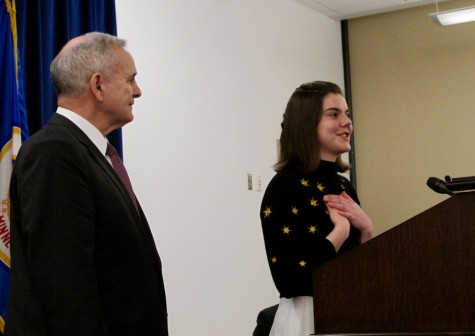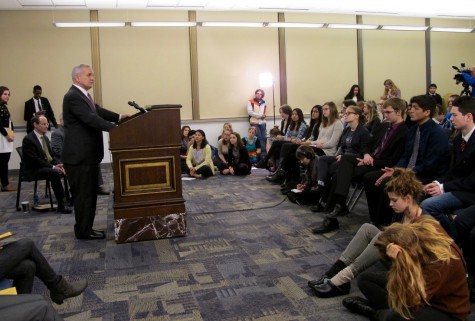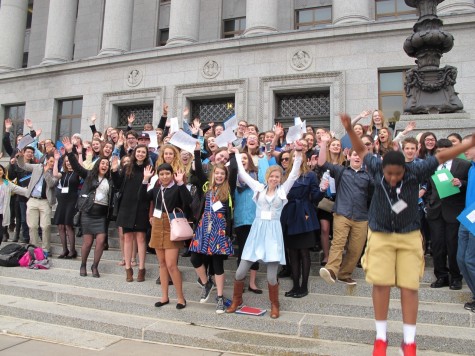Student activists lobby for equity in environmental legislation
March 22, 2016

High school and college students from across the state flocked to the capital for Youth Lobby Day on March 14th.
This year’s event focused on environmental justice and the EPA’s Clean Power Plan, the first piece of federal legislation to limit CO2 emissions from power plants.
The plan sets a 2030 targets for emission cuts state by state, based on the potential for renewable energy. States have flexibility in how they reach the necessary reductions, whether it be growing wind and solar sectors, promoting energy efficiency, or using nuclear power.
Governor Dayton intends to move ahead with the plan, despite outcry from some Republicans who believe that Minnesota should stop spending tax money to implement it locally, since it has been halted in Washington due to challenges in lower courts.
The youth at the event not only support the Clean Power Plan, but they push legislators to implement it so that the transition to clean power takes into account, and empowers, low income citizens and communities of color.
“What made this lobby day kind of special was that we were lobbying for the Clean Power Plan and not only straight up environmental policy, but how are we gonna actually implement the Clean Power Plan in a racially, economically and environmentally just way,” explained senior and lobby day veteran Addie Welch. “So there was room for conversations about equity.”

12 south students were among the 75 young people at the Youth Summit with Governor Dayton in the morning. Welch moderated the conversation, opening with a personal story. She talked about how she felt compelled to chose to be involved in either the racial or environmental justice movement, before she realized they were deeply related.
Senior Kendra Roedl and sophomore Soline van de Moortele were among the many youth that asked questions of Dayton, pressing him to articulate plans to involve frontline communities in the implementation of the Clean Power Plan. Frontline communities, such as the neighborhood around South are most harmed by environmental degradation due to their racial and economic status.
“In the past, Governor Dayton has been really supportive of environmental legislation. He was kind of caught off guard by the environmental justice approached. So it was good to push him on that,” said Welch.
Sophomore Anikka Mikk found some of Dayton’s responses evasive, but she was impressed overall. “I think he answered a lot of people’s questions well…a lot of the people going didn’t have all the details on issues, not because they weren’t looking for the information but because the info wasn’t out there for them to find,” she said.
“It was really cool that he said, kind of automatically, a simple ‘yes’ to if he would veto any bills that would delay the Clean Power Plan,” continued Welch. “Otherwise, he’s a politician. He can’t always guarantee things, especially our really specific demands.”
After the Summit, the youth headed to appointments with their district representatives and senators.
Mikk met with Senator Patricia Torres Ray, who authored a bill to create “green zones” in the city to protect minority communities from further industrialization of their neighborhoods. The bill hasn’t passed, but she invited South students to partner with her and organize around the issue.
“She got really excited to hear high school students, mostly that we were all together at one school, the majority of us, and really excited about getting together a group of us to support her bill,” said Mikk.

The group concluded the afternoon by singing a song about environmental justice written to the tune of “We Will Rock You” by Queen. They had planned to sing on the capitol steps which were under construction, so they gathered across the street and belted above the sounds of the machinery.
This being her third lobby day, Welch enjoyed accompanying newcomers like Mikk. “A lot of them were talking about how they were nervous to talk to their legislators, but they did and they had a good time,” she said.




